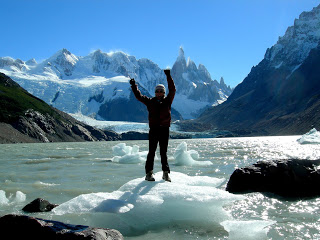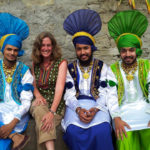Traveling Solo and Falling in Lust: A Conversation with Comedy Writer Kristin Newman

While browsing the New York Times travel section a few weeks ago, I came across this picture:

My eyes widened. As I read about Kristin Newman’s book What I Was Doing While You Were Breeding: A Memoir, my curiosity grew. Fast forward, I read the book , contacted Kristin, and here we are! We interviewed Kristin about her adventures abroad and what it’s like to have shared so many intimate details about her life with the world. Not too shabby!
Let’s talk solo travel. Would you tell us about your first time?
Well, my first time really getting on a plane and going all by myself was when I went to Argentina for two months at 31. Here is an excerpt from the book about that first time:
Everyone with whom I normally traveled was either overemployed or underemployed or too married or too pregnant to travel. And so there was . . . a VOID.
“Kristin, a void is a good thing,” my mother said. “You’re always rushing to fill up your life with fun fun fun. But nothing new or good can come in without a void to fill. Voids are necessary and wonderful.”
So I spent about a week after my work year ended just being in all of that voidy space, just feeling all of that sweet nothing . . . and then I bought a one-way ticket to Argentina. At thirty-one, I had one regret in my life: I had never lived in another country.
Readers learn a lot about your romances abroad throughout the book. I found myself nodding when I read “Vacation romances are so sweet because they are finite.” Do you have any tips for creating that experience when not on vacation?
Well, the title of my last chapter is “Love Like You’re About to Get Deported.” So, that’s one piece of advice. Imagining your partner dying later that day, or running off with a waitress… these are all great ways to really savor those moments together. (Smiley face.)
Any tips for Pink Pangea members who are dating abroad — or thinking about it?
Dating from country to country is so different, so it’s really on a case-by-case basis. In France you don’t “date” – you start a romance, consummate, and then either continue it monogamously or end it and move on. There is no “go out with one person, kiss them at the end of the night, then go out with the next person the next night” thing in France.
In Israel, it’s very straightforward. There is no small talk. They ask if you would like to go to bed, you say yes or no with no bad feelings or beating around the bush, and then everyone goes on with their life. The non-religious in Israel might be the most sexually promiscuous people in the world, so be ready.
In Brazil, be prepared for them to skip Second Base. Brazilians are not into boobs. Also, they will run those bases within ten minutes of meeting you, in public. Just straight to third, right there in the restaurant lobby. Be ready.
And you already read in my excerpt about dating Argentines. My advice with them: just enjoy.
While in Russia, you found yourself having to just sit at a table, unable to communicate with words. Would you tell us a bit about that experience?
Sure! Here is another excerpt about that:
No one spoke English, and Sasha and her mother both spoke Russian, so at these dinners I would have to sit quietly and pick at my egg, cheese and mayonnaise bowl that Russians call a “salad.”
Sitting quietly at dinner parties was not my natural strong suit. At home, I worked hard at dinner parties. Not just at being entertaining, which I believe to be a holy duty of dinner party guests, but also at keeping the conversation constantly going, noticing people who were being left out and asking questions to draw them in, filling the awkward silences. Maybe this need to keep everyone happy and getting along is just my nature, or maybe it stems from a childhood as an only child in a disintegrating marriage, trying to be the happy glue that kept the splintering family together. Please know that I’m not complaining about it, since it’s a skill that’s probably exclusively responsible for my success as a sitcom writer.
Sitcom writers often group write, sitting around a big table, so we talk all day long. Sometimes, on some shows, you literally never sit alone in front of a computer just writing. And I worked exactly as hard in a writers’ room, around that table, as I did around dinner tables. I never realized how hard I worked around tables day and night until the trip to Russia, when I couldn’t. I just had to sit there. At first this was excruciating. I felt completely not myself, dead weight in a little life raft adrift in a sea of incomprehensible and sometimes stilted conversation.
Earlier that year, at a meditation workshop with a stressed-out friend, the meditation guide was walking us through an exercise, and asked us a question that we were to think about as we sat.
“With no thoughts, with no words, what am I?”
Dead. Immediately, with medium-size panic and a shortness of breath, that was my answer. Without thoughts, words, speech . . . death. My career and my identity were filled with millions of words daily, and without them I would be a black hole. My friend and I talked about the question after the class, and I was surprised to hear that her reaction had been absolutely opposite from mine. For her, the idea of no words, and no thoughts, made her deeply calm and peaceful.
For me it meant I was gone.
But on that trip to Russia, I eventually got used to being without words. I could still smile at people, and pass the bread, and look friendly. I was not just the words that came out of my mouth. I was still there without them. And that’s when I just ate my cheese salad and relaxed. I relaxed to such a degree that I realized I had never been relaxed at any dinner party in my entire life. This was my favorite part about my trip to Russia.
What do you think holds women back from traveling solo more often? What advice would you give to anyone thinking about it?
I imagine that women are afraid of two things: loneliness/awkwardness, and physical safety. On the physical safety front, I think it’s important to remember that all single women, wherever you are, are moving through space alone, even in their own city. There is no reason why Paris or Tel Aviv should be more dangerous than your own home town. So just use the same common sense abroad that you use at home, and it isn’t any more dangerous. (Unless there’s war. Try not to go somewhere where there is war.)
As far as loneliness and awkwardness go, the secret about traveling alone is that you are rarely alone for long. You will meet twenty times as many people alone as you will traveling with a buddy. You’re so open and desperate for company that people take you in… often because they fear for your safety. Couples, women, men, children… everyone sees you sitting there, worries about you, and invites you over. Use this! Also, join day tours… you’ll meet people you can ask out to drinks and dinner after the tour is over, which is the only time the lonely bug has ever gotten to me. And learn early the importance of bringing a book to solo meals – without one, you will be miserable. With one, and a glass of wine and a great meal? You are a romantic picture of independent happy solitude.
Last piece of advice: don’t stay at fancy places. Expensive hotels/tours/boats/planes will be filled with rich older couples. Solo travelers are in budget and mid-range options. If you aren’t under 25, mid-range will weed out the college kids.
Like in many great memoirs, you shared many intimate details about your life. What has the response been so far?
So mixed! The positive feedback has been by far winning out, from old friends who have expressed how great it was to get to learn what I’ve been doing in the life I’ve lived since we were close, from family and friends who have loved seeing parts of their lives immortalized. It’s been magical to hear from so many strangers, mostly women, who say they are booking their first solo trip because of my book, or send me pictures of my book on their pretty knees on their vacations. People are taking the book very personally, telling me it’s validated their life choices, or inspired them to honor the quiet little voice in their head telling them they want to live their lives differently.
But some people also feel very criticized by the book. The title sounds like I judge the people who have chosen to have families, which is absolutely not how I feel, and which is clear if you read the book, but that has offended many. Some people are very, very upset that I am not broke and a virgin. I’ve definitely hurt people in my life with the stories, too. The moral question about the act of writing a memoir is definitely on my mind: yes, these were my stories to tell. But they involved people who didn’t get to tell their side, and didn’t get to vote on whether or not they wanted the stories told at all. I gave many of my friends and family the option to read and edit sections that were about them, but I didn’t do that for everyone. And some of those people have been hurt. And I regret that very much, and struggle with it. But this book poured out of me – it really was a story I needed to tell. I needed to see what those years had added up to: not just wasted crazy times, but a real life lived and a real collection of lessons learned. Writing it was the most therapeutic thing I’ve ever done.
Were you ever stereotyped abroad? What was that like?
Sure, people love to make fun of Americans. But usually if you own it, and make fun of yourself, too, they are surprised, and decide you’re actually okay. This is probably good advice for all areas of life.
Anything else–travel tip, inspiring quote, etc–you’d like to share with the Pink Pangea community?
My addiction to travel romance was probably about one thing more than anything: my need for crazy, over-the-top, magical movie moments. To that end, I’d like to share this Chuck Klosterman quote that I love, about the plight of the movie-loving romantic:
“But whenever I meet dynamic, nonretarded Americans, I notice that they all seem to share a single unifying characteristic: the inability to experience the kind of mind-blowing, transcendent romantic relationship they perceive to be a normal part of living. And someone needs to take the fall for this. So instead of blaming no one for this (which is kind of cowardly) or blaming everyone (which is kind of meaningless), I’m going to blame John Cusack.”
What’s next for you?
Italy! I just got married, and we got a week at a friend’s apartment in Positano as a wedding gift. I have a fantasy of me and my husband in 1960s Italian movie star clothes, in a ‘60s Alfa Romeo, driving up the Amalfi coast. There will be a glamorous head scarf and large glasses, and probably a white dress like Diane Lane wore in “Under the Tuscan Sun.” If we drive off the road into the sea like everyone promises we will do in Italy in August, it won’t be a bad way to go.








